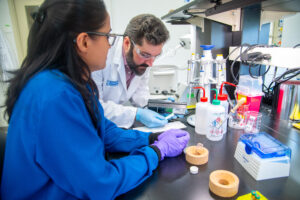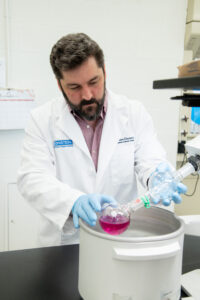Juan Pablo Maianti, PhD ‹ Back To 2024 Winners
2024 Winners
Assistant Professor
Department of Biochemistry
The Albert Einstein College of Medicine & The Montefiore Einstein Comprehensive Cancer Center
Vision
We envision that drug discovery can be redefined to defeat the most challenging oncology targets by discovering ligands that form irreversible chemical bonds with their target proteins. A homing missile is a good analogy—the structure of the ligand acts as the guidance system, recognizing its target site and positioning a warhead to strike. By finely tuning the ligand structure, we can reprogram the warhead to react with other targets. We are developing a screening platform to simultaneously screen millions of small molecules readable by DNA barcodes to detect and decode the structures of new homing missiles to hit untapped cancer targets. This will enable us to push the boundaries of irreversible drug discovery beyond traditional biomedical targets and to solve cancer targets previously considered “undruggable.” This screening approach will open new treatment options for cancers underserved by current medicines and conventional drug-discovery pipelines.
JP Maianti is an Assistant Professor at The Albert Einstein College of Medicine and The Montefiore Einstein Comprehensive Cancer Center. Prior to joining Einstein, he co-founded and worked at Exo Therapeutics Inc, a startup company spun off from his PhD and postdoctoral research at Harvard on targeting enzyme exo-sites, instead of catalytic sites, to achieve specificity and substrate-selective inhibition. JP was born and raised in Uruguay and holds a Ph.D. in Chemistry and Chemical Biology from Harvard University (2015), a M.Sc. in Organic Chemistry from the University of Montreal (2011), and B.Sc. in Biochemistry from the University of Canterbury New Zealand (2004). Highlights of his research include the C&EN’s Talented 12 nomination, the Canadian Governor General Gold Medal, the Knowles Award from the Bioorganic Chemistry Gordon Research Conference, and a profile of Exo Therapeutics among the C&EN News 10 Start-Ups to Watch.
Covalent Drugs for Unsolved Cancer Targets using Electrophilic DNA-Encoded Libraries

Irreversible inhibition, connecting a ligand with its biomedical target though a covalent bond, is a new tactic in the arsenal of anti-cancer drugs to increase therapeutic potency, specificity, and efficacy. Unlike conventional inhibitors, irreversible ligands permanently adhere to proteins without relying on sizeable drug-friendly pockets that correspond to enzyme cofactors and catalytic sites, which are the primary focus of pharmaceutical companies. Using irreversible ligands, we can break this paradigm and tackle biomedical targets that are presently impervious to conventional drug discovery approaches. We are establishing a platform to screen millions of DNA-barcoded small molecules carrying irreversible warheads by using DNA amplification and DNA sequencing to detect and decode the structures of new irreversible ligands for challenging biomedical targets.

“The Pershing Square Sohn Prize will enable us to create a powerful DNA-barcoded screening platform to identify ligands with finely tuned reactive warheads that permanently adhere to challenging oncology targets to unlock their unrealized therapeutic potential.”
Using this new DNA-encoded platform, we are setting our crosshairs on untapped oncology target proteins, and on new therapeutic modalities beyond blocking catalytic sites. We are establishing irreversible ligands that (i) reignite a broken tumor suppressor to elicit tumor cell death, (ii) achieve selectivity between almost identical twin proteins, and (iii) dislodge a tight multi-protein complex that selectively triggers a hidden vulnerability killing tumor cells. The Pershing Square Sohn Award will enable us to execute on this portfolio of impactful oncology targets that are well supported by predictors of feasibility, efficacy, and tolerability, but that are unattainable by conventional drug approaches. Our ambitious program will establish new applications for irreversible ligands that unlock new treatment options for intractable cancers and address the needs of broad patient populations underserved by current medicines and current pharmaceutical pipelines.
“A thought from the late Nobel laureate Prof. Sydney Brenner has always resonated with me—’Progress in science depends on new techniques, new discoveries and new ideas; probably in that order.’ We are committed on innovating on the drug discovery toolkit because we envision this will have the greatest impact on scientific progress towards addressing the biggest challenges in medicine today.”